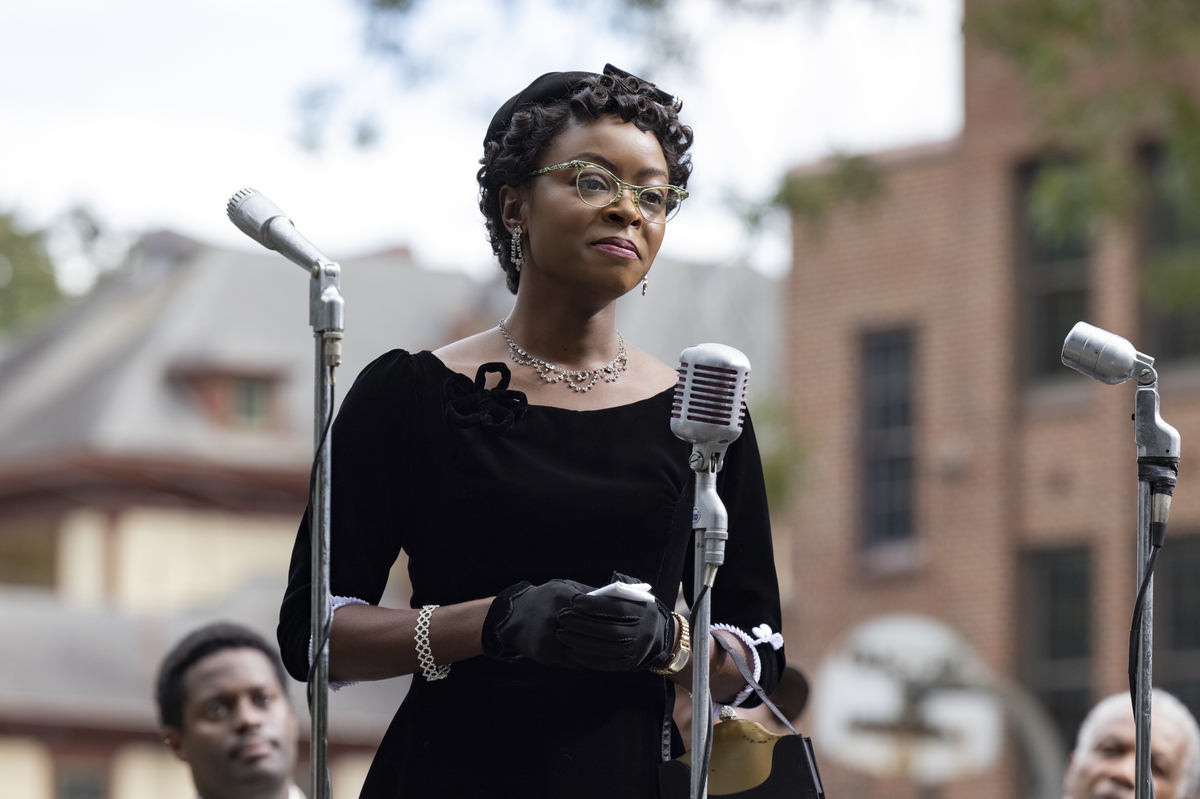
[ad_1]

Danielle Deadwyler stars as Emmett Till’s mom, Mamie Till-Mobley, in Till.
Lynsey Weatherspoon/Orion Pictures
disguise caption
toggle caption
Lynsey Weatherspoon/Orion Pictures

Danielle Deadwyler stars as Emmett Till’s mom, Mamie Till-Mobley, in Till.
Lynsey Weatherspoon/Orion Pictures
Like many Black folks in America, director Chinonye Chukwu grew up studying in regards to the story of Emmett Till, the 14-year-old Black boy who was brutally murdered in Mississippi in 1955 for allegedly flirting with a white lady. But far fewer folks know the story of Till’s mom, Mamie Till-Mobley.
Chukwu says Mamie and different Black ladies are sometimes neglected or erased from historical past. But Mamie’s resolution to carry an open-casket funeral for her son, and to publish pictures of his mutilated face, served as a catalyst for the civil rights motion.
“Without Mamie Till-Mobley, the world wouldn’t know who Emmett Till was,” Chukwu says. “She wanted the world to witness what happened to her child so then this can stop happening to other Black children and Black people.”
Her new movie, Till, works to afford Mamie her “rightful place in history” by telling the story by her perspective. Though Emmett’s homicide is central to the narrative, Chukwu purposefully selected to not painting it on-screen: “I knew that the physical violence that was inflicted upon Emmett was not a necessary or important part of the story I wanted to tell, which was that of Mamie’s journey and her becoming an activist — and also the love and humanity that existed between her and her child.”
Till is Chukwu’s third movie. Her earlier motion pictures are Alaskaland and Clemency. Clemency received the 2019 dramatic grand jury prize on the Sundance Film Festival.
Interview highlights
On filming upsetting materials, and caring for the actors and crew on set
Myself and the producers have been very intentional about defending the psychological and emotional well-being of everyone. So we had a therapist on set who was obtainable to the solid and crew and was simply such a useful useful resource in serving to us course of our emotions in actual time. The dad and mom of the kid actors have been on set and I needed them as shut as doable day-after-day, if doable. And after I discuss to their youngsters, I discuss to them as properly, as a result of they’re additionally part of this journey. …
When we have been capturing this scene the place Emmett’s kidnapped, the actor who performs Emmett, Jalyn, who was 14 on the time, after a take or two, he had requested if we are able to pause so he can get a hug from his mother, and we simply dropped every thing so he can get a hug from his mother. And if Jalyn would have informed me I do not need to do any extra takes, then we would not have performed any extra takes. We’re human beings in the beginning. Those are a number of the ways in which we have been actually conscious of care. Also, there have been just a few scenes I restricted to 2 takes as a result of I simply did not need to undergo that, put the actors by that repeatedly. And so I might inform the crew, “Listen, whatever we get in these takes is what’s going to be in the film. So let’s just make it as great as possible. But then we got to move on.”
On recreating Till’s lifeless physique for the movie, utilizing a mould manufactured from actor Jalyn Hall’s physique
It was a really harrowing course of as a result of I learn and reread post-mortem experiences of what was performed to Emmett and checked out diagrams and punctiliously examined the {photograph} and did a little bit little bit of analysis about what being in water for 3 days does to a physique. … The actors who interacted with the physique, like Danielle and Sean Patrick Thomas, who performs Gene, they did not see or contact the physique till we have been able to shoot the scene. And so the very first time they noticed it was on digicam.

Director Chinonye Chukwu speaks to actor Jalyn Hall, who performs Emmett, on the set of Till.
Lynsey Weatherspoon/Orion Pictures
disguise caption
toggle caption
Lynsey Weatherspoon/Orion Pictures

Director Chinonye Chukwu speaks to actor Jalyn Hall, who performs Emmett, on the set of Till.
Lynsey Weatherspoon/Orion Pictures
On exploring Mamie Till-Mobey’s non-public self and public self
One of the large issues that I discovered that Danielle Deadwyler, the actress who performs Mamie, and I talked about so much, was the complicated negotiation she needed to make between her private and non-private self, her presentational self, and who she was in non-public. She’s navigating lots of completely different sorts of masks that she’s having to placed on as a Black lady on this planet, a Black lady in America. So, as an illustration, when she goes to Mississippi for the trial and it is at this predominantly white, hostile house, and he or she could be very a lot conscious of these gazes and her presentational self in that house, versus who she is when she’s all by herself, versus who she is when she’s together with her baby, versus when she’s together with her associate, Gene, household, and so on., and so on. There are these fixed negotiations she’s having to make.
There’s a scene within the movie the place Mamie is having a dialog with Huff, who’s the authorized counsel for the NAACP, and he is vetting her basically, and based mostly on how he thinks folks will come at her, how he thinks the media will come at her. And so eager to be sure that she’s able to face that and people sorts of racist, sexist negotiations that Mamie’s going to should navigate, the offended Black lady stereotype, the Jezebel stereotype, and this sort of policing of her physique language and the way in which she seems to be. And all of that’s completely what I and so many Black ladies on this planet are always navigating in our lives to today. And so I actually, actually empathized with Mamie in that means.
On how the movie reveals the trial of the lads accused of Till’s homicide, however omits the not-guilty verdict
I actually needed to maintain the narrative by Mamie’s perspective, her perspective as a lot as doable. And so she left earlier than the decision was introduced as a result of she already knew what the decision was going to be. And additionally, the ending of the movie just isn’t in regards to the verdict. One of the issues that Dr. T.R.M. Howard — who’s, in my view, an unsung civil rights hero — requested Mamie in the course of the trial when she visits Mississippi, is, “What is the work you’re going to do regardless of the verdict?” Because there’s nonetheless work to be performed and we can’t put all our hopes on justice, progress and alter on a verdict that is determined by inside a system that is arrange in opposition to you. And so I used to be eager about that when eager about, how do I would like the arc of this movie to be? And it can’t finish on the verdict. It’s about a lot extra. And Mamie involves that realization in her personal form of arc within the movie, and that propels her to go away and go on to being an activist on this planet, as a result of there’s a lot work to be performed.
Lauren Krenzel and Susan Nyakundi produced and edited this interview for broadcast. Bridget Bentz, Molly Seavy-Nesper and Beth Novey tailored it for the net.
[adinserter block=”4″]
[ad_2]
Source link





